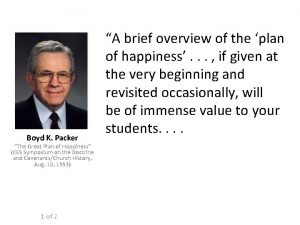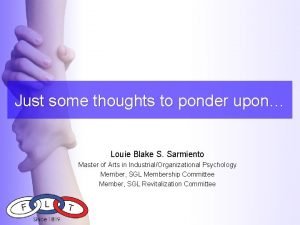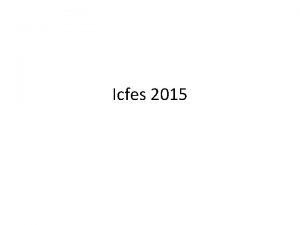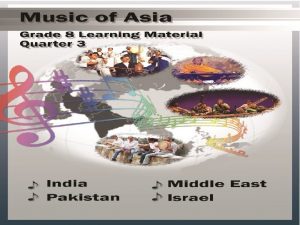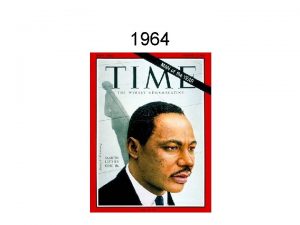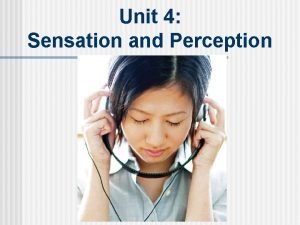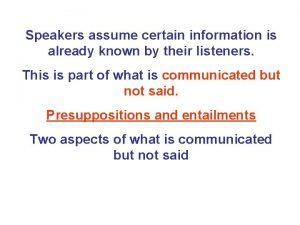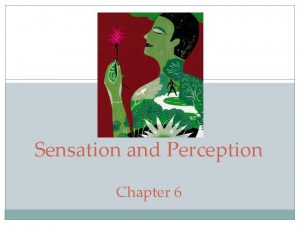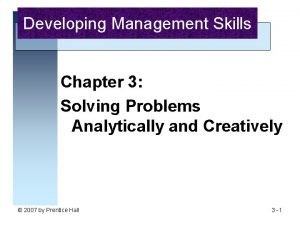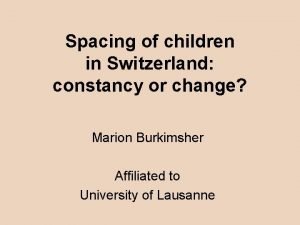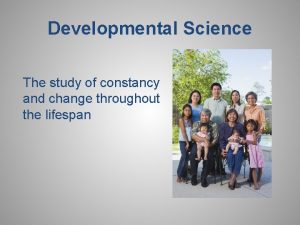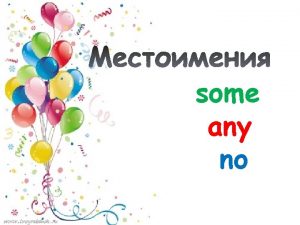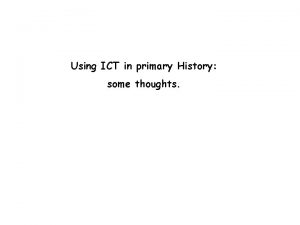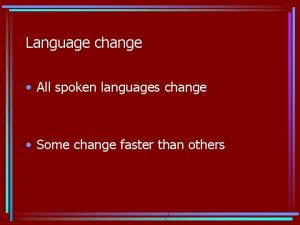Constancy in Times of Change Some Thoughts around














![Sean Feerick – Equavet Self-assessment as a part of QA [Quality Improvement] is about Sean Feerick – Equavet Self-assessment as a part of QA [Quality Improvement] is about](https://slidetodoc.com/presentation_image/60be5a70e73b6f658d59c47a825e51d6/image-15.jpg)




- Slides: 19

Constancy in Times of Change Some Thoughts around Quality Assurance in Further Education and Training

Time of unprecedented change in our sector • Product • Provider • Governance • There is a danger that something will get lost or mistakes will be made • In times of change, we need to find a constant • SOLAS expectations • Changing QA expectations: tutors concerns




Quality Assurance ≠ Quality • QA procedures & templates are very useful tools, • However, Quality is not a set of procedures, but a personal commitment from each one of us • Integrity, accountability and transparency should govern all we do

The role of the Coordinator is crucial • Learner—make sure that their voice is not lost • Tutor/teacher—uncertainty in times of change • Feedback on briefs/ IV/EA/Appeals • Mentoring • Encouraging CPD as it becomes available • ABOVE ALL: You need to create a culture where it is safe to make mistakes, and to learn from them

Developments that are happening at national level • Governance • National Assessment Procedures Handbook • EA panel • Review of Work Experience modules

Different Languages, Different Cultures

So, how can we develop a common culture and find a common path?

Constancy in times of change…? • Not Quality Assurance but Quality Improvement • Reflection & self-assessment

Developing a culture of quality • The development of a culture of quality is about creating trust: with learners, within the organisation, and with employers • • Takes time Take leadership Takes open communication Developing a common discourse • A crucial element to building that trust is continuously reflecting on our practice, and identifying how we can continue to improve on our quality

How can we use self-reflection to help forge a common culture of quality?

I would love to see… • A culture of reflection where a consideration of quality (as opposed to simply quality assurance) is central: • Consisting of a series of iterative reflective dialogues and feedback loops • Learners/teachers/other stakeholders have an awareness of their role in contributing to a culture of quality, and feed into a self-evaluation process • A culture where it is safe to make mistakes and to learn from them
![Sean Feerick Equavet Selfassessment as a part of QA Quality Improvement is about Sean Feerick – Equavet Self-assessment as a part of QA [Quality Improvement] is about](https://slidetodoc.com/presentation_image/60be5a70e73b6f658d59c47a825e51d6/image-15.jpg)
Sean Feerick – Equavet Self-assessment as a part of QA [Quality Improvement] is about 1. Learning organisations and learning individuals 2. and needs self-reflection at all levels (not just school level) 3. Being an integral part of everyday life of schools 4. There should be continuous discussion about quality and what it comprises 5. Developing a shared understanding of quality 6. The involvement of all stakeholders

Change is difficult…

The challenge we are facing at the moment…we need to keep current provision going, while our sector is going through seismic changes

You play an essential role in that change

Above all… your role is to work to ensure that everyone who comes on your programme has an experience that is: Founded on: Respect Communication delivered with: Integrity Transparency Accountability In doing that, you will be well on your way to developing a culture of quality within your programme
 Great plan of happiness
Great plan of happiness I am not my thoughts
I am not my thoughts 15 times 15 times 20
15 times 15 times 20 Some thoughts to ponder
Some thoughts to ponder Elephant riding in phuket resuelto
Elephant riding in phuket resuelto A rope is wrapped many times around a drum of radius 50 cm
A rope is wrapped many times around a drum of radius 50 cm Toft instrument of israel
Toft instrument of israel كما تدين تدان english
كما تدين تدان english Martin luther king of hinduism
Martin luther king of hinduism Ponzo illusion
Ponzo illusion Brightness constancy assumption
Brightness constancy assumption Brightness constancy equation
Brightness constancy equation Brightness constancy example
Brightness constancy example Define gender constancy
Define gender constancy Entailment
Entailment Color constancy example
Color constancy example Gestalt effect meaning
Gestalt effect meaning Presupposition examples sentences
Presupposition examples sentences Constancy psychology
Constancy psychology Constancy commitment compression complacency
Constancy commitment compression complacency
